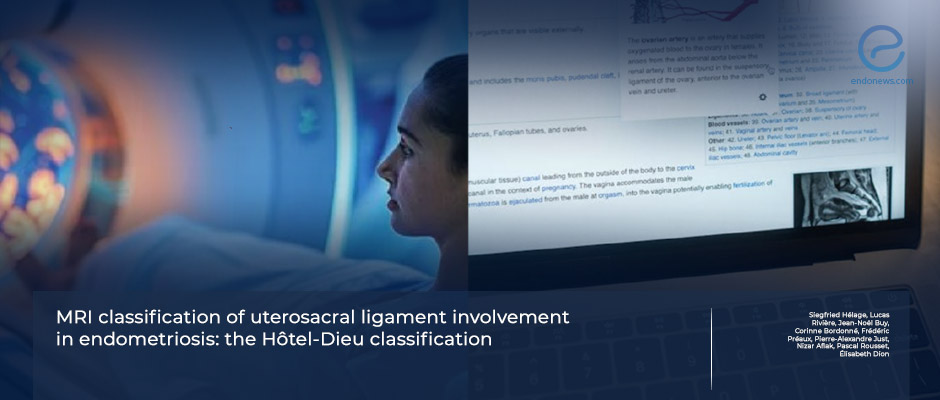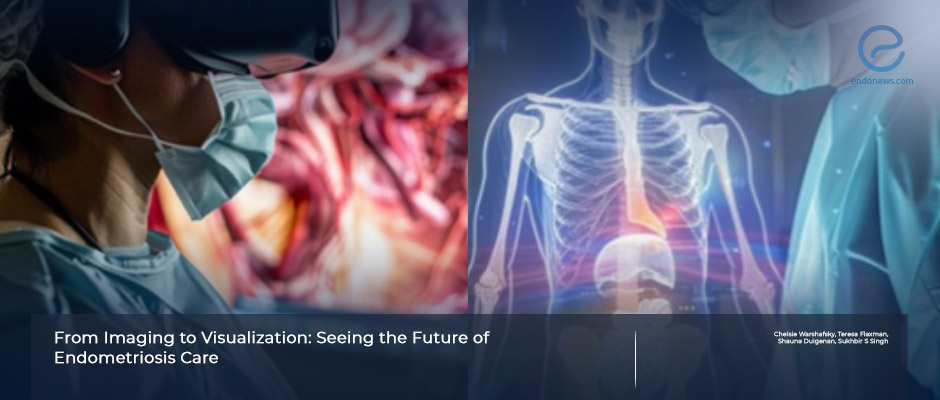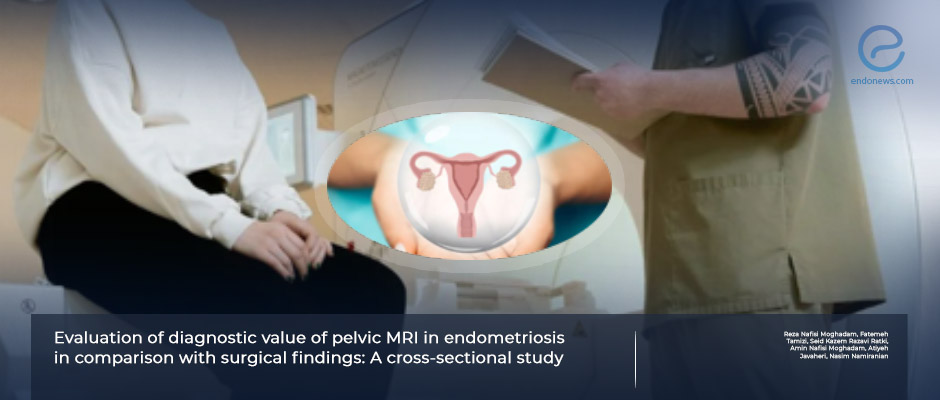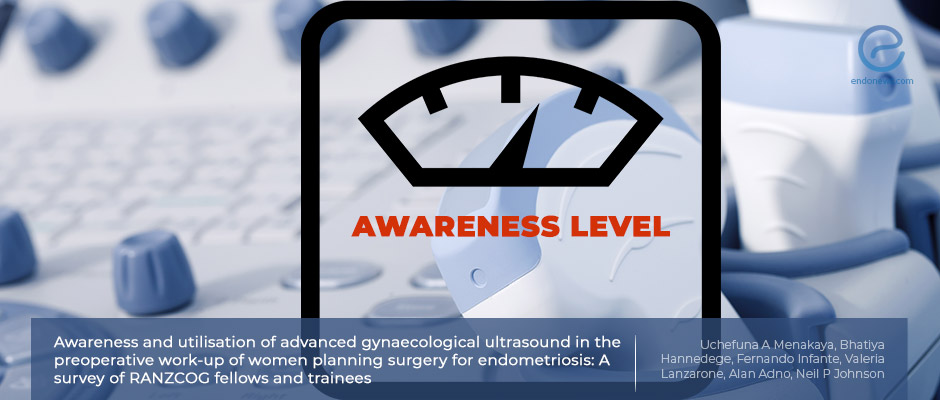Non-invasive MRI Based Detection of Uterosacral Deep Infiltrating Endometriosis
Deep infiltrating endometriosis (DIE) frequently affects the uterosacral ligaments, with a prevalence of around 70% in affected patients. However, there is no consensus on the imaging anatomy of the uterosacral ligaments (USLs). Currently, the assessment of USL endometriosis is subjective, lacking…
Key Points Lay SummaryAdenomyosis as a Barrier to Effective Surgery for Dyspareunia in Rectovaginal Endometriosis
Women with endometriosis often experience severe pain during intercourse, known as dyspareunia, which can deeply affect their quality of life and intimate relationships. One form of this condition, rectovaginal septum endometriosis, involves deep, scarred tissue that can cause pain during…
Key Points Lay SummaryIntegrating Virtual Reality Modeling for Enhanced Surgical Management of Endometriosis
Transvaginal ultrasound and magnetic resonance imaging (MRI) conducted by experts are generally sufficient for the surgical planning and management of endometriosis, as noted in a recent study published in the Journal of Minimally Invasive Gynecology. However, incorporating novel techniques such as 3D printing…
Key Points Lay SummaryMRI Improves Deep Infiltrating Endometriosis Diagnosis
Magnetic resonance imaging (MRI) with susceptibility-weighted imaging sequence is the best method of non-invasively diagnosing endometriosis, according to a new study published in the International Journal of Reproductive BioMedicine. However, the authors noted, “Laparoscopy is still the gold standard of…
Key Points Lay SummaryEndometriosis treatment at diagnosis: Is it possible?
For most cases of endometriosis, a diagnostic laparoscopy followed by a therapeutic laparoscopy is recommended by The National Institute for Health and Care Excellence. Hypothesizing that patients with endometriosis might benefit from receiving only a therapeutic laparoscopy, combining diagnosis and…
Key Points Lay SummaryTransvaginal ultrasound or MRI for retroflexed uterus in endometriosis
Dr Matsuda and colleagues from the Department of Obstetrics and Gynecology, Nippon Medical School, Tokyo, Japan have published their study evaluating the effectiveness of transvaginal ultrasound on the diagnosis of uterine retroflexion in a recent issue of “Journal of Nippon…
Key Points Lay SummaryValidity of Magnetic Resonance Imaging for Deep Pelvic Endometriosis.
Video laparoscopy has become a valuable tool for diagnosing and managing endometriosis in recent years. In cases associated with deep infiltrating endometriosis, the need for a non-invasive diagnostic method before laparoscopic evaluation paves the way for using MRI. The use…
Key Points Lay SummaryThe accuracy of transvaginal ultrasound and magnetic resonance imaging for deep urinary tract endometrisis.
The prevalence of urinary tract endometriosis is 19-53% in patients within deep infiltrating endometriosis cases. The bladder and ureteral are the most common sites of the involvement. While preparing a radical surgery for a patient with deep endometriosis, the diagnosis…
Key Points Lay SummaryPlanning surgery for recto-sigmoid endometriosis with 3D virtual models.
Efforts to reduce the high complication rate of rectosigmoid surgery in deeply infiltrated endometriosis are of great interest to gynecologists. 3D printing, currently used in various surgical specialties to support surgical planning and guide intraoperative procedures may be a way…
Key Points Lay SummaryPreoperative endometrioma diagnosis
The current clinical experience of gynecologists and radiologists indicates that distinguishing a hemorrhagic cyst from endometriomas or ruptured corpus luteal cysts is compelling. For this reason, chosen criteria that can lead to decisive distinctions are valuable for preoperative identification of endometriomas.…
Key Points Lay Summary“Advanced gynecological ultrasound” for women with suspected endometriosis
Different clinical forms of endometriosis such as superficial endometriosis, endometrioma, and deep infiltrating endometriosis are present. Although no specific diagnostic tool is available for endometriosis, clinical findings, physical examination and imaging including transvaginal ultrasound and MRI are helpful to determine…
Key Points Lay SummaryComparison of diagnostic accuracy of imaging modalities for the deep infiltrating endometriosis
The treatment of deeply infiltrated endometriosis (DIE) is usually personalized and the potential success for the available therapeutical options is dependent on early and accurate diagnosis. Laparoscopy is the gold standard for the diagnosis of DIE. Other non-invasive diagnostic methods…
Key Points Lay SummarySegmental bowel resection could be predicted using MRI in patients with rectal endometriosis
The rectum and recto-sigmoid junction are the preferential localisations of bowel endometriosis. The three main surgical approaches are shaving, disc excision, and segmental resection. It is very important to decide the most appropriate surgical method preoperatively and to plan accordingly. …
Key Points Lay SummaryDoes Getting Pregnant Really Help When You Have Endometriosis?
Pregnancy has a favorable impact on the volume of deep infiltrating endometriosis lesions according to a study published in the scientific journal "PLoS One". This is the first study that demonstrates such a favorable impact of pregnancy on endometriosis lesion…
Key Points Lay SummaryCloverleaf Sign: A new MRI sign for diagnosing DIE
Magnetic resonance imaging provides accurate information for the staging of deeply infiltrating endometriosis, especially when the patient is virgin, obese or has limited transvaginal examinations due to pelvic pain. In this recently published study in Investive Radiology, Harma et al.…
Key Points Lay SummaryNot a malignancy, it is "polypoid endometriosis"
Ghafoor S. et al., from Memorial Sloan Kettering Cancer Center, NY, USA, has recently reported a case of a 60-year-old postmenopausal woman with an incidental pelvic mass mimicking a pelvic malignancy on ultrasound. Their paper has been published in the…
Key Points Lay SummaryWhich Diagnosis Technique is Better?
Transvaginal ultrasound provides a more accurate localization of vaginal and recto-vaginal endometriosis compared to magnetic resonance imaging (MRI) according to a study published in the International Journal of Gynecology & Obstetrics. However, MRI has better accuracy in detecting bladder endometriosis…
Key Points Lay SummaryThe appearance of postoperative endometriosis by imaging methods
Endometriosis is a chronic gynecological disease mostly encountered in reproductive-aged women. Endometriosis can occur in three different entities: peritoneal, ovarian and deep endometriosis. Golden standard diagnosis is made by histopathological examination of surgical material after laparoscopic surgery in women with…
Key Points Lay SummaryPreoperative Staging of Endometriosis: The Value of MRI After Dynamic Transvaginal Ultrasound
Since endometriosis is a chronic and progressive disease, early diagnosis and proper staging are important for the patient and for the clinician to discuss and plan the required surgical procedures for treatment. Common diagnostic tools for pre-operative staging of deep…
Key Points Lay SummaryMultimodality imaging and clinicopathologic assessment of abdominal wall endometriosis
Abdominal wall endometriosis is a rare clinical entity frequently diagnosed with a significant delay and easily misinterpreted despite multimodality imaging. In the study of Jaramillo-Cardoso et al. which has recently been published in the journal Abdominal Radiology, the clinical, multimodality…
Key Points Lay SummaryA Way to Better Diagnose Colorectal Endometriosis
Combining magnetic resonance imaging (MRI) with computed tomography-based virtual colonoscopy (CTC) can make the assessment of colorectal endometriosis more accurate. This is important because it can help doctors plan the surgery better and inform their patients. In order to evaluate…
Key Points Lay SummaryMRI Best at Detecting Intestinal Deep Infiltrating Endometriosis
Magnetic resonance imaging (MRI) seems to be a better method in identifying deep infiltrating endometriosis in the intestine compared to two-dimensional ultrasonography (2DUS), found a study by researchers in Italy and Spain. However, this does not seem to be the…
Key Points Lay SummaryNew Approach could help Preoperative Differentiation of Endometriosis and Cancer
Researchers in Japan identified some radiological parameters that could be used to differentiate between endometriosis-associated ovarian cancer (EAOC) and a particular type of benign ovarian endometriosis (OE), making it easier for doctors to offer the right treatment to women who…
Key Points Lay Summary
 By Selma Oransay
By Selma Oransay


 By Özge Özkaya
By Özge Özkaya


 By Eylül GÜN
By Eylül GÜN

 By Nasuhi Engin Aydin
By Nasuhi Engin Aydin





 By Hale Goksever Celik
By Hale Goksever Celik





 By Irem Onur
By Irem Onur






